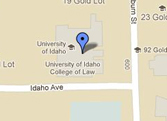College of Law
Moscow

uilaw@uidaho.edu
Administration Office: 208-885-2255
Dean’s Office: 208-885-4977
fax: 208-885-5709
Menard 101
711 S. Rayburn Drive
Mailing Address:
College of Law
University of Idaho
875 Perimeter Drive MS 2321
Moscow, ID 83844-2321
Boise
First Monday - October 4, 2010
In this issue:
- Jeker Family Trust Makes Grant Commitment of $100,000 for Idaho Law Learning Center
- Tax Clinic Gives Students Real-World Exposure While Serving Low-Income Taxpayers
- U.S. Department of Justice Designates College of Law to Provide Education Loan Repayment Assistance for Prosecutors and Public Defenders
Jeker Family Trust Makes Grant Commitment of $100,000 for Idaho Law Learning Center
The University of Idaho has received another boost in its progress toward establishing an Idaho Law Learning Center at Boise, in collaboration with the Idaho Supreme Court. The Jeker Family Trust, a private charitable foundation headquartered in the state capital, has made a grant commitment of $100,000 to help pay for renovations that will enable the old Ada County Courthouse to become the future home of the Idaho Law Learning Center. As noted in previous editions of “First Monday,” the Law Learning Center will provide a synergistic venue for legal education, the Idaho State Law Library, continuing judicial education, and law-related education for the public. The Jeker grant will be applied to “tenant-specific improvements” needed in order to adapt the historic courthouse to these new, multiple public purposes. The building, owned by the State of Idaho, also will undergo general infrastructure renovations planned by the Division of Public Works in the State Department of Administration.
To date, the College of Law has received $1.625 million in private commitments, including the Jeker Family Trust grant, in support of the Idaho Law Learning Center and the University of Idaho’s initiative to fulfill of its statewide mission in legal education. The Jeker Family Trust is a generous supporter of educational and cultural projects benefitting Idaho schools and communities. The Trust’s executive director, Boise attorney E. Don Copple, is a member of the College of Law class of ‘66.
Further information about the College’s statewide mission and the proposed Idaho Law Learning Center may be obtained from Dean Burnett (dburnett@uidaho.edu) or from Lee Dillion (dillion@uidaho.edu), Associate Dean for Boise Programs.
Tax Clinic Gives Students Real-World Exposure While Serving Low-Income Taxpayers
The College of Law is widely known in legal education circles for the remarkable range of clinical opportunities it makes available to a relatively small student body. One such clinical opportunity, the Low-Income Taxpayer Clinic (LITC), is funded with grants from the U.S. Internal Revenue Service. The LITC enables students to develop expertise in tax-related administrative law, dispute resolution through negotiation, and litigation in the United States Tax Court -- while also learning on a personal level how to serve distressed clients, such as the proprietors of struggling small businesses. The students are supervised by clinical instructor Barbara Lock, whose teaching draws upon her extensive prior tax practice and her LL.M. degree in tax law.
During the past summer, University of Idaho law students successfully settled a disputed tax obligation in a factual context that has become increasingly common in the current residential real estate market. The case involved a lender’s write-off of the balance owed by an insolvent (or nearly insolvent) borrower on a recourse loan in default, following repossession of the property. The tax issue, resolved by settlement, was whether the write-off should be treated as the taxable forgiveness of a debt.
Thus far in the fall semester, students already have participated in representing, or assisting, clients in eleven cases on the docket of the U. S. Tax Court in Boise. Most of the cases have settled, but two of them recently went to trial. Professor Lock has reported that the clients were highly satisfied with the students’ work. The experience has enabled students to meet – and to make professional connections with – the Tax Court judge and staff, seasoned attorneys for the IRS, and other local tax practitioners.
Like the College’s other clinical programs, the LITC places students squarely at the intersection of theory and practice. Further information about the LITC is available from Professor Lock (block@uidaho.edu) in Boise. Information about other clinical opportunities may be obtained from Professor Maureen Laflin (mlaflin@uidaho.edu), Director of Clinical Programs, whose office is in Moscow.
U.S. Department of Justice Designates College of Law to Provide Education Loan Repayment Assistance for Prosecutors and Public Defenders
For many students, the College of Law is a gateway to careers in public service. A cost-effective public legal education in Idaho enables students to graduate with manageable debt loads; but the economics of public service can still be daunting. Now, the College of Law is able to offer further help to those students who choose to devote part or all of their careers to public service in the criminal justice system. The College has been designated by the U. S. Department of Justice (DOJ) to administer a grant program that provides educational loan repayment assistance to lawyers who commit to at least three years of state or federal service as prosecutors or public defenders.
The program, titled the “John R. Justice Student Loan Repayment Program” (in honor of an aptly named former president of the National District Attorneys Association who was an ardent advocate for lawyers in public service), will provide loan repayment assistance in amounts up to $6000 per year in Idaho for selected, qualifying individuals. The assistance will be limited to funds provided by the DOJ; for Idaho, during the current fiscal year, the DOJ-allocated funding level is $100,000, of which approximately $85,000 will be available for distribution. Criteria for selection include the relationship between an individual’s salary level and indebtedness, the proportional overall treatment of prosecutors and public defenders, and the geographic dispersion of recipients among urban, suburban, and rural settings.
The Idaho program administrator will be Helen Albertson-Ploucha (hap@uidaho.edu), Associate Dean for Students and Administration, at the College of Law. Potential applicants (who need not be alumni of the College) are invited to visit the College’s website at http://www.uidaho.edu/law/jrjgrant for further information.


